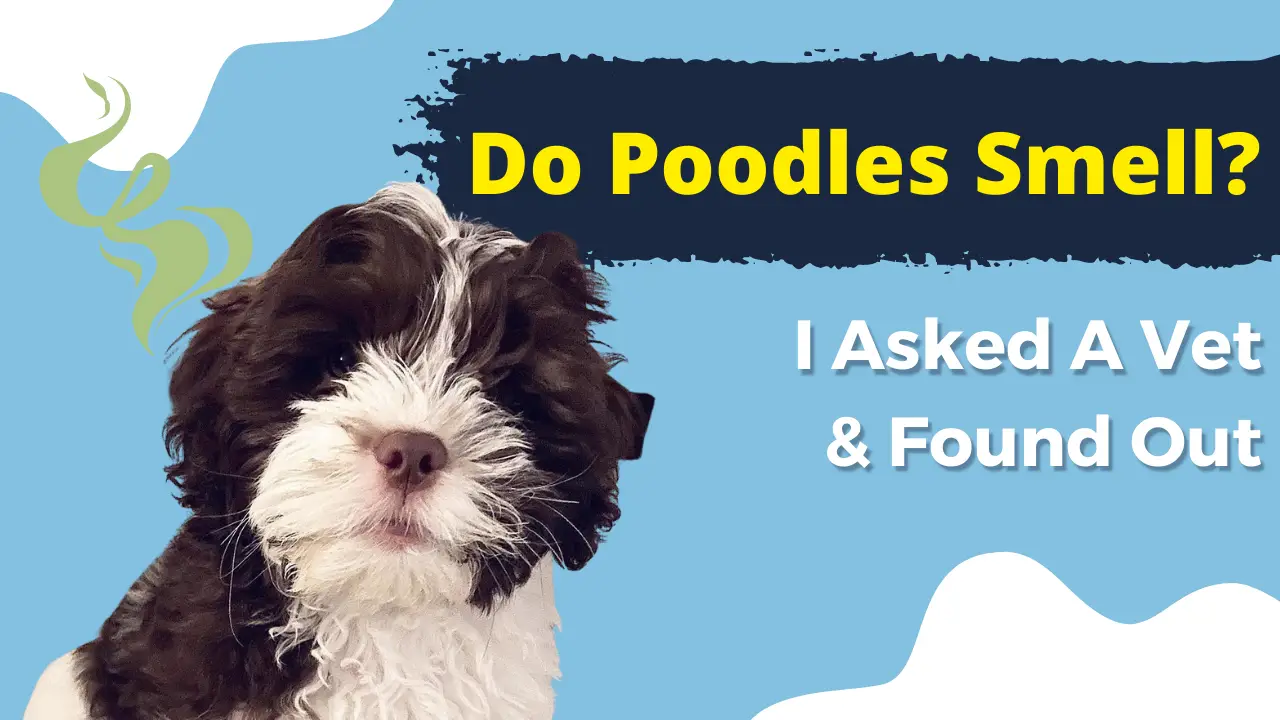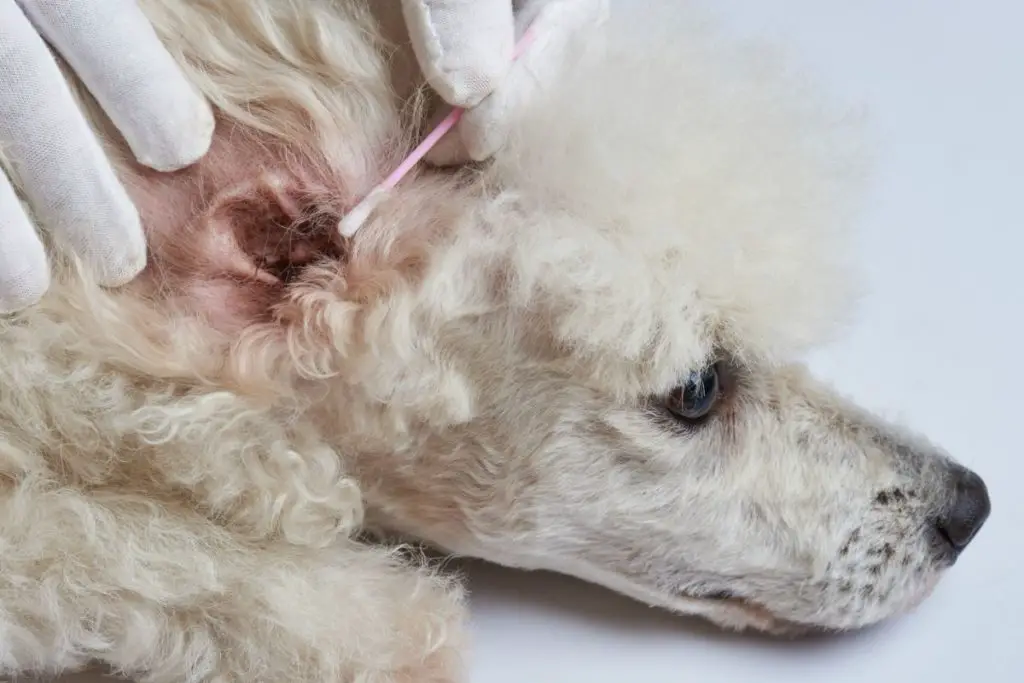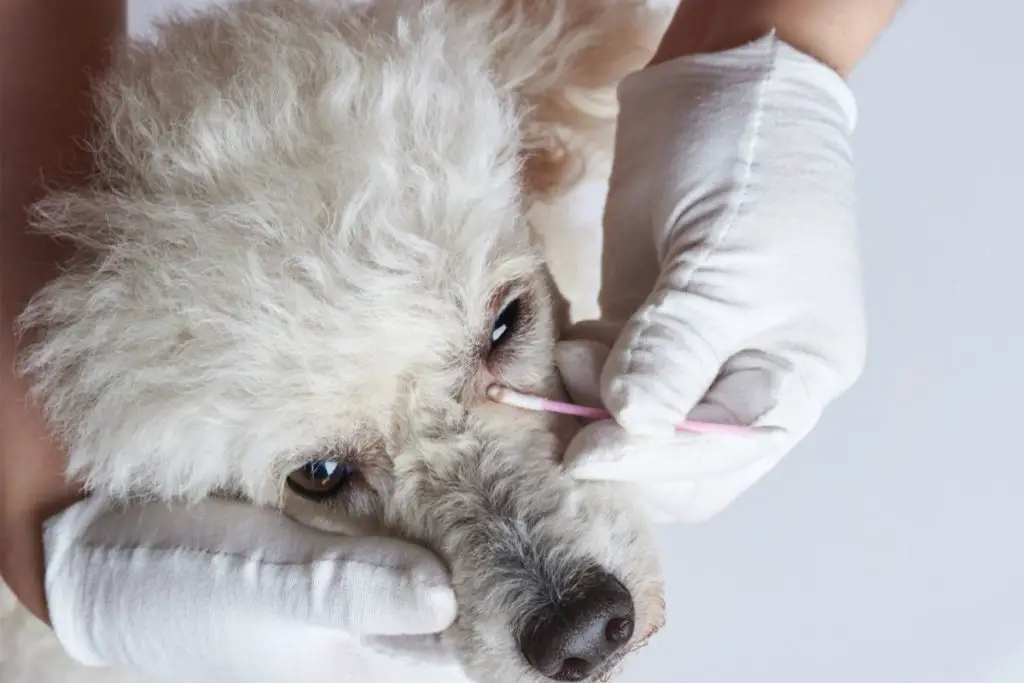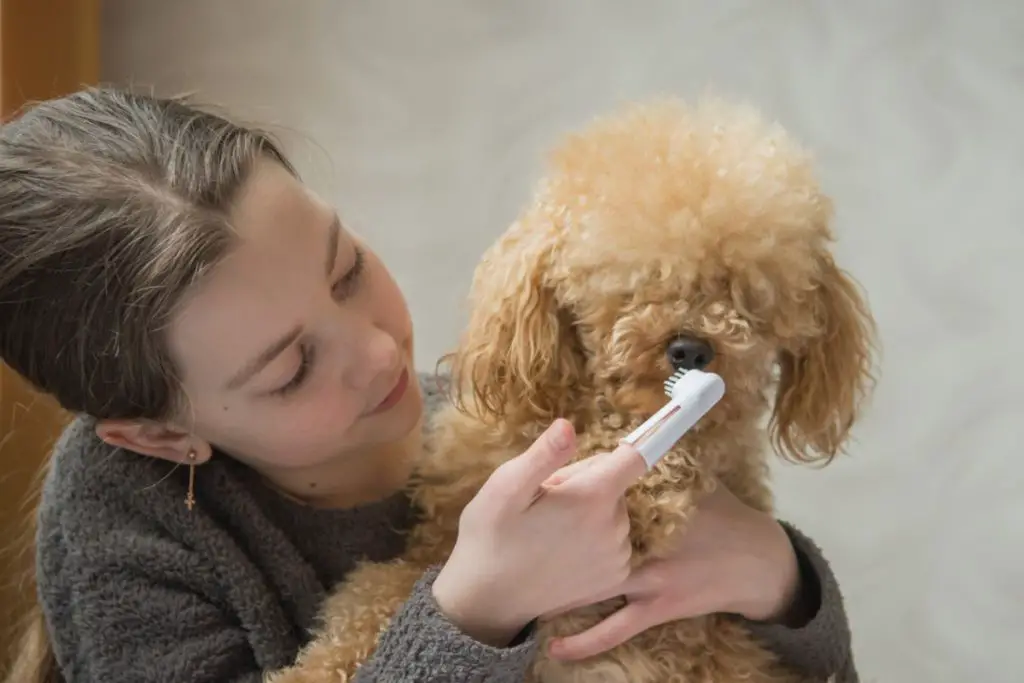Poodles aren’t typically known as smelly dogs. They usually don’t give off a doggy odor like other breeds. At the same time, there are times when your Poodle might smell bad even though you’ve just given it a bath.

Due to their thick, curly, water-resistant hair, it’s hard to get Poodles to smell clean even if you’ve just bathed them. You’ll need to pay extra attention to thoroughly lather up and scrub your Poodle to remove body oil and dirt least once every 3 weeks. You might notice a yellow or brown deposits on top of the teeth called calculus.
What Will You Learn? 👇
Skin Infections
Does your Poodle smell bad even though you’ve bathed it recently?

Read our Smart Poodles - Smart Tricks eBook for only $2.99
Dive into a treasure trove of engaging tricks and tips designed specifically for your poodle!
A common reason for bad canine smells can come from a skin infection. Many skin infections result from incorrect grooming habits.
While you will need to get your Poodle soaked to the skin for proper washing, it’s just as important to ensure that you’re getting your dog completely dry.
A Poodle’s dense hair can trap water at the roots. When a Poodle doesn’t get completely dry, this dampness can cause the skin to fester. Wet fur can lead to staph infections that can cause an odor.
Check for any cuts, scratches, or irritated areas on your Poodle’s skin. Make sure to thoroughly towel him dry to the roots during bath time.
Ear Infection
If you have a Poodle, he/she will likely experience at least one ear infection during his or her life. Dogs with long or floppy ears tend to have more ear infections. Hair can also grow into the ear canal and cause irritation or infection.

A bad smell coming from your dog’s ear will tip you off about the cause. You might also notice your pet rubbing her head against furniture or floors or pawing at her ears.
Other symptoms to watch for include discharge running from an ear or a thick plug of wax blocking an ear canal.
Some dogs seem to get more ear infections than others. The good news is that there are some simple ways to reduce canine ear infections.
- Put cotton or small earplugs in your dog’s ears prior to bath time to keep water from getting into his/her ear canal.
- Pluck any stray hairs from the ears
- Use a special pair of clippers to groom inside your dog’s ear
Before jumping into any inner ear grooming, make sure that you get your Poodle’s ear infection under control first. Your pet isn’t going to want you to dig around inside his ear if he’s in pain.
If cleaning and rinsing don’t clean out earwax, take your Poodle to the vet right away to avoid any serious issues.
Eye Infection
Eye infections are another cause of Poodle smell that comes from poor grooming.
It’s important to cut your Poodle’s hair short around his eyes and keep it trimmed. Since Poodles have long, curly hair, hair that gets too long can fall into a dog’s eyes, get trapped there, and cause an infection.
If you can’t see your Poodle’s eyes, then it’s time for a trim. Chances are that hairs stuck in your Poodle’s eyes are creating an irritating infection that’s causing a smell.

It’s best to trim any long hairs right away. Next, pick up some medicine from the vet to clear up that eye infection. Your dog will thank you.
Oral Issues
If you smell a foul odor coming from your Poodle, check its mouth for any food stuck between its teeth. You might notice a sticky film called plaque covering your dog’s teeth. Plaque develops from a combination of saliva and food residue. If this isn’t removed, untreated plaque can lead to tartar deposits.
Tartar is a hard, calcified buildup that can cause tooth decay. It’s often the culprit for bad odors coming from a Poodle’s mouth. If left untreated, tooth decay can cause your Poodle’s teeth to fall out.
Adult dogs aren’t the only ones who benefit from good dental hygiene.
Make sure to brush your puppy’s teeth, too, since this can cause tooth or gum disease. Even puppies can develop oral issues if their milk teeth rot and compromise the adult teeth before they emerge.
Brush your Poodle’s teeth at least 3 times per week. This helps prevent plaque from food residue from turning into tartar. Cleaning your pet’s teeth regularly also reduces the risk of rotting teeth and gum disease that cause pain and odors.
It’s important to use the correct type of toothbrush to brush your Poodle’s teeth. While chew toys can help with tooth health, they aren’t enough to keep your dog’s teeth clean.
Try a three-sided canine toothbrush or an electric option, such as an ultrasonic toothbrush, to get your dog’s breath smelling sweet again. Ultrasonic toothbrushes have a pulsating head that helps remove thick tartar buildup.

If you regularly brush your Poodle’s teeth and still detect a smell, your dog might simply have bad breath. You can pick up a doggy mouthwash to get rid of any halitosis and get your pet smelling clean again.
Flatulence
This kind of smell is easy to miss but hard to ignore.
Some dogs pass gas loudly while others do it silently. Owners don’t hear anything but are hit with the smell.
Typically, a normal amount of gas is nothing to worry about. Most dogs break wind up to 10 times a day. It’s a normal part of releasing extra gas pent up in the intestines.
When your Poodle passes gas, you’ll smell a noxious mix of four elements that include oxygen, carbon dioxide, hydrogen sulfide, and methane. While no one likes to smell any of these, it’s the hydrogen sulfide that will tip you off due to the pungent smell.
If your Poodle seems to have temporary flatulence issues, you can reduce episodes caused by eating too fast by putting your Poodle’s meals in a slow-feeder bowl.
Another thing to check if your dog seems extra gassy is their food. Cheaper dog food brands are often packed with additives and fillers. Your dog might not get the nutrients that he needs. As a result, he will try to eat more to feel full. Like fast food for humans, cheap dog food can cause increased digestive and flatulence issues.
Try to buy more expensive dog foods such as PetPlate. While it might cost you more, expensive dog food brands are specially formulated to give balanced nutrients. They also are more likely to have 100% natural ingredients and steer clear of chemicals, additives, and preservatives.
For chronic flatulence issues, check out any GI issues or food allergies with your veterinarian. You can also give your dog proenzyme powder supplements to help reduce digestive problems and help with nutrient absorption in the future.
Anal Glands
Every Poodle has two of them located on either side of the base of the tail. If your Poodle smells extra bad in this location, these glands are probably to blame.
Get a dog groomer or vet to express fluid from these glands if it isn’t happening naturally when your dog does his business.
It’s important to do this right away if you notice a smell, since once the glands burst, it can cause a nasty skin infection. If you notice that this has already happened, take your dog to the vet to get your Poodle treated with antibiotics.
Poop Stuck in Its Fur
An easy way to eliminate bad smells is to check your Poodle’s fur after they use the bathroom.
If you’re sitting down to watch TV or working from home and catch a whiff of something that smells like poop, it’s time to investigate.
Even if your pooch has trimmed fur around their rear end, Poodles often come back in from doing their business with some of it still stuck to them.
To get rid of this bad smell and prevent your pet from messing up your furniture or floors, it’s a good idea to check your dog at the back every time you let him outside.
Using a canine wet wipe to get rid of any business back there will not only help keep your Poodle smelling better but avoid infections in that area.
Urinary Tract Infection
If your Poodle whines, urinates too often and has a foul odor, a Urinary Tract Infection (UTI) is likely the culprit.
Common symptoms of a canine UTI include
- Urinating frequently
- Having accidents in the house
- Bloody urine
- Crying out or whimpering while urinating
- Compulsively cleaning herself
If you notice any of these symptoms combined with a terrible smell, take your Poodle to see the vet immediately. Getting medical attention is the only way to treat a UTI in female dogs. Female poodles are also more likely to get a UTI when they are in heat.
Untreated urinary tract infections can cause serious and painful health problems in the future. Thankfully, a small amount of medicine will clear this up right away.
If your Poodle’s urine smells strong but he doesn’t have any other symptoms, this can be a sign of dehydration. Check to make sure that your Poodle is getting adequate water for his size and activity level. Most Poodles need at least 1 ounce of water per pound of body weight per day. If your Poodle is exercising or out in hot weather, she will likely need more water.
You can also eliminate strong urine smells by wiping your Poodle down after he or she uses the bathroom.
Female Poodle in Heat
If you notice that your female Poodle smells bad, check to see if she is in heat. Unlike humans, female dogs only have a cycle every 6 months. This fertile period can last anywhere from 2-4 weeks.
The blood associated with a season can smell metallic, but should not be rotten or pungent. If the discharge is foul-smelling, this would be more consistent with a pyometra (uterus infection). Other signs of a uterus infection to watch for would include excess thirst, vomiting, panting or abdominal bloating.
A uterus infection tends to occur about 2-3 months after a season. So if a dog seems to be in season but it has come shortly after the previous one, an owner should be suspicious. This is especially true in an older bitch, as they are more prone to pyometra.
If your dog appears normal, without undue pain or fishy smells, then it’s likely that she’s just experiencing a regular heat period. Bathe your Poodle more often during her cycle. This will prevent buildup on her fur and help get rid of smells.
You may also want to regularly use a soft canine wipe to wipe your Poodle’s vulva from front to back. This helps prevent bacteria transfer and keeps your pooch clean during her cycle.
One way to identify female Poodle vaginal issues is by smell. It’s typically very strong, with a musty scent or pungent odor like vinegar or rotten fish.
Just because your Poodle is in heat doesn’t mean that she should smell this way. Strong vaginal odors point to health issues such as UTIs, bladder infections, or yeast infections.
Some owners choose to put a Poodle in a doggy diaper while she’s on her period. Change it every 4-12 hours depending on how heavy the flow appears. If you notice any foul odors or extra discomfort, take your Poodle to the vet for a dose of medicine.
Marko is the founder and author at PoodleHQ, where he blends profound expertise with formal training in Animal Behavior and Canine Genetics. With multiple generations of poodles under his care, he’s a breed connoisseur, honored with the Canine Care Excellence Award and lauded by the International Pet Enthusiasts Association.

